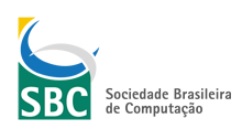Simulação Multiagente de uma Abordagem Evolutiva e Espacial para o Jogo do Ultimato
Resumo
Este trabalho apresenta uma simulação multiagente para uma abordagem evolucionária espacial do Jogo do Ultimato, implementada no software Netlogo. Considera-se uma população heterogênea de agentes com informação incompleta sobre as estratégias de outros agentes. Para a evolução das estratégias dos agentes, com o objetivo de auto regular as trocas proporcionadas pelo jogo, balanceando objetivos individuais e coletivos, é utilizado um algoritmo genético. Apresentam-se os resultados das simulações realizadas, com a comparação dos resultados em dois cenários diferentes.
Referências
Alexander, J. M. (2009). Evolutionary game theory. In Stanford Encyclopedia of Philosophy, Stanford. Stanford University.
Andreoni, J. and Miller, J. (2002). Giving according to garp: An experimental test of the consistency of preferences for altruism. Econometrica, 70(2):737–753.
Camerer, C. F., Ho, T.-H., and Chong, J. K. (2001). Behavioral game theory: Thinking, learning and teaching. JOURNAL OF RISK AND UNCERTAINTY, 19:7–42.
Dimuro, G. P., Costa, A. C. R., Gonçalves, L. V., and Pereira, D. R. (2011). Recognizing and learning models of social exchange strategies for the regulation of social interactions in open agent societies. Journal of the Brazilian Computer Society, 17(3):143–161.
Fehr, E. and Schmidt, K. M. (1999). A theory of fairness, competition, and cooperation. The Quarterly Journal of Economics, 114(3):817–868.
Fiani, R. (2006). Teoria dos Jogos. CAMPUS.
Goldberg, D. E. (1989). Genetic Algorithms in Search, Optimization and Machine Learning. Addison-Wesley Publishing Company, Reading, Massachusetts.
Kellermann, G. A. (2008). Aspectos estatísticos e dinâmicos do jogo do ultimato espacial e não espacial. Master’s thesis, PPGC da UFRGS, Porto Alegre/RS.
Laguna, M. and Moscato, P. (1996). Capitulo 3: Algoritmos geneticos. In Diaz, B. A., editor, Las Nuevas Técnicas Heurísticas y las Redes Neuronales, pages 67–103. Ed. Paraninfo, Madrid.
Lieberman, E., Hauert, C., and Nowak, M. A. (2005). Evolutionary dynamics on graphs. Nature, 433(7023):312–316.
Linden, R. (2008). Algoritmos Genéticos. Brasport, Rio de Janeiro/RJ, 2 edition.
Nowak, M. A., Page, K. M., and Sigmund, K. (2000). Fairness versus reason in the ultimatum game. Science, 289(5485):1773–1775.
Oosterbeek, H., Sloof, R., and van de Kuilen, G. (2004). Cultural differences in ultimatum game experiments: Evidence from a meta-analysis. Experimental 0401003, EconWPA.
Page, K. M., Nowak, M. A., and Sigmund, K. (2000). The spatial ultimatum game. Proceedings of the Royal Society of London B Biological Sciences, 267(1458):2177–2182.
Piaget, J. (1995). Sociological Studies. Routlege, London.
Szaba, G. and Fáth, G. (2007). Evolutionary games on graphs. Physics Reports, 446:97–216.
von Neumann, J. and Morgenstern, O. (1944). Theory of games and economic behaviour. Princeton UP.
Watts, D. J. and Strogatz, S. H. (1998). Collective dynamics of small-world networks. Nature, 393(6684):440–442.
Xianyu, B. (2010). Social preference, incomplete information, and the evolution of ultimatum game in the small world networks: An agent-based approach. Journal of Artificial Societies and Social Simulation, 13:2.



